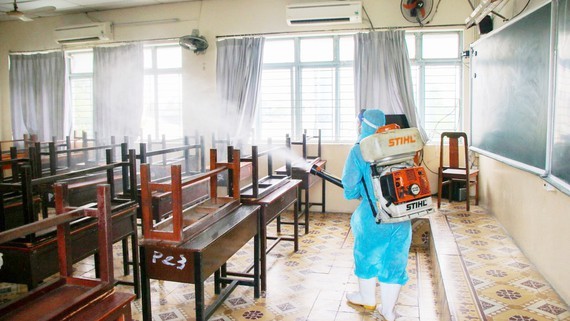
On the morning of December 2, teacher Ha Huu Thach, principal of Le Quy Don High School in District 3, said that currently, the average class size is 35 students, tables and chairs will be rearranged to ensure distance regulations for the safety of students.
According to the pilot scheme of two-week direct teaching for grade 12 students, the timetable is designed to be no more than four lessons in the morning, including Saturday mornings. Students study online on all afternoons.
In-person classes will be for correcting assignments, testing out the new skills, language, or knowledge students have gained through the course of the lesson or overall topic, and teachers spend time reviewing the core knowledge of the program.
At the same time, hand sanitizers, medical masks will be distributed for all classrooms, and more disinfection lights in the toilets will be installed. Moreover, a medical isolation room near the school gate will be built for the treatment of suspected cases.
Similarly, Principal Vu Thi Ngoc Dung of Bui Thi Xuan High School in District 1, said that the school will organize one lesson per day for two weeks of in-person teaching for grade 12 students. If everything goes on well, the school will organize two shifts a day in the second semester.
However, class sizes should not exceed 35 students per class, homeroom teachers and subject teachers will arrange seats for students to ensure safe distance. Big-size classes will be arranged in larger classrooms and libraries to ensure the safety of students.
In addition, the school has bought tonics including vitamins C, D, and zinc to distribute to students when they return to school to strengthen their resistance. Currently, the rate of school students receiving two doses of the Covid-19 vaccine is more than 98 percent.
Ms. Vu Thi Ngoc Dung emphasized that the school's top priority is educating students about self-discipline. When a student or a teacher is suspected of being infected in the classroom, their close contacts will be kept at home to monitor their health, but not force all students in the class to return to online learning because it will disturb the learning process of students.
Tran Dai Nghia High School for the Gifted in District 1 alternatively arranged one classroom and one empty room. In the coming time, the school will welcome back students of grades 9 and 12. It will organize one shift a day and two shifts a day, and the school even offers day boarding according to parents’ demands.
The school will combine face-to-face and online teaching, both deliver lessons of the remaining program of the first semester and consolidate students’ knowledge. Teacher Nguyen Minh, the school's principal, shared that the school prioritizes direct teaching for basic subjects such as Maths, Literature, foreign languages, Chemistry, and Physics while some subjects such as technology, art, and music will be taught on internet.
Principal of Nguyen Du High School in District 10 Huynh Thanh Phu said that in order for the effectiveness of the epidemic prevention and control, it is necessary to have good coordination between the school and students’ parents in making medical declarations and information of infected cases in families. Parents should not let students with ill symptoms come to school.
Deputy Director of Ho Chi Minh City Department of Education and Training Duong Tri Dung said that each educational institution has its own characteristics in terms of location, students and teachers. Therefore, schools should develop an appropriate epidemic prevention plan suitable for them, which must calculate the possible scenario if it has to change the operating state.
According to the Ho Chi Minh City Department of Education and Training’s guidance, high schools in low-risk areas are eligible for resuming in-person classes within 30 hours a week while facilities in medium risk areas can organize in-person classes no more than 18 hours a week.
Face-to-face classes for students of grades 6, 9, and 12 will be arranged for no more than 24 hours a week. Kindergarten, primary school, junior high schools operate according to the alert level in Thu Duc City or districts.
For educational institutions in high-risk areas, schools must deploy blended learning is generally applied to the practice of using both online and in-person learning experiences no more than 12 hours a week. Students of grades 6, 9, and 12 will attend face-to-face classes for no more than 18 classes a week. Particularly, educational institutions in the area of level 4 (very high-risk areas) only organize online teaching, on television and give lessons to students to study at home.
























